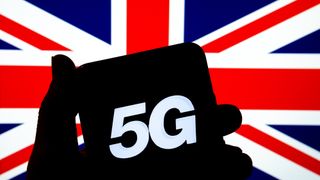Can the UK develop a 5G giant to take on Huawei?
Things aren’t easy for Huawei at the moment, but its woes could be someone else's opportunity. Is it time for the UK to develop its own 5G giant?

There’s no denying that the past few years have been tough for Chinese telecoms giant Huawei. Despite enjoying record smartphone sales in western markets, its future isn’t so clear as governments continue to impose restrictions on the firm due to national security fears.
Following pressure from Washington and a reassessment of the company’s networking technology by the National Cyber Security Centre (NCSC), the UK government has banned Huawei from any involvement in the country’s 5G network. With Huawei out of the picture, a gap emerges for competing firms from across the globe to be involved in the development of Britain’s next-generation mobile network infrastructure. But could it be filled by a homegrown, UK company?
No easy task
The biggest challenge for a homegrown 5G company would be the sheer volume of Huawei’s existing portfolio. It has been ahead in the development and research of 5G technologies for several years, with reports claiming that the firm owns the majority of patents in this area.
“It is not easy to create a tech giant. The barriers and pre-requisites are immense. In order to compete in the 5G race, then the UK has probably missed the boat,” says Paolo Pescatore, a technology, telecoms and media analyst at PP Foresight.
For UK-based companies looking to dominate the field of mobile networks, their best bet is to look to future developments in the industry. Pesctore says: “Looking further afield, then there is no reason why the UK cannot look to home grown technology. There needs to be a significant push from key stakeholders, including the government, to ensure the right ingredients are in place including attracting the key creative and technical expertise.
“This is something the EU is keen to foster with plans to invest in 6G. Europe is keen to regain its technological leadership. Each generation is happening far more quickly so it makes perfect sense. A cultural shift is required with a clear focus on supporting R&D.”
Although researching and developing a new technology like 6G won’t be cheap, it is clearly a lucrative opportunity. Pesctore says that costs aside, the potential benefits could be huge in fuelling sustainable growth for the region in the future.
Get the ITPro. daily newsletter
Receive our latest news, industry updates, featured resources and more. Sign up today to receive our FREE report on AI cyber crime & security - newly updated for 2024.
“In essence, this move also suggests the desire to create the next group of FAANGs (Facebook, Apple, Amazon, Netflix, Google) to come from Europe. For sure this will have an impact on the UK as a result of Brexit,” he says.
“Let’s not forget both Ericsson and Nokia are global leaders and are European-based companies. Ultimately, partnerships with smaller and more agile niche solution providers would make logical sense. The majority of these companies bring to market novel solutions that will allow UK plc to future-proof networks.”
Taking on Goliath
Despite the fact that many will be pleased by the UK government’s decision to halt the involvement of Huawei in British 5G networks, some have questioned whether this is the right decision.
Robert Pocknell, IP partner at Keystone Law, says: “While the UK is said to have considered the intellectual property rights, it’s not clear how much consideration has been given to the bigger picture of the other intellectual property that Huawei owns (including its portfolio of 5G patents), and what steps Huawei could take if they are excluded from the UK market.
“Huawei is ranked first worldwide for the number of ‘standards essential patents’ (SEPs), which are the patents that must necessarily be infringed when making a product which complies with a communications standard like 5G.”

The IT Pro Podcast: The truth about 5G
We look at the good, the bad and the conspiracy theories surrounding the new technology
Given that Huawei owns a large bulk of 5G patents, it would be difficult for a homegrown company to develop its own innovations and could end up being sued by the Chinese tech giant.
Pocknell says: “If Huawei adopts the same licensing practices as Nokia and others, who are part of a patent consortium that is refusing to license SEPs to businesses selling communication products, then Huawei could seek injunctions to stop companies using 5G networks unless they pay excessive royalties, and that will drive up pricing for other vendors, and ultimately for network operators and consumers.”
Like Pectore, he believes it would be difficult for UK technology firms to compete with Huawei. He adds: “Whilst the Digital Secretary Oliver Dowden wants to make the UK’s mobile networks less dependent on companies like Huawei, Ericsson and Nokia, unless the government take steps to prevent companies engaging in unfair, unreasonable and discriminatory SEP licensing practices, it will be hard or nearly impossible for smaller, UK-based technology companies to compete in the market.”
Seizing the opportunity
While it seems impossible for the UK to develop its own 5G giant at this stage, that doesn’t mean it can’t succeed in the field of mobile connectivity as a whole. Björn Odenhammar, chief technology officer of networks and managed services at Swedish mobile communications firm Ericsson, says: “If the UK is to seize the economic opportunity of 5G, it needs to act soon.
“The question therefore shouldn't be about creating a UK-based 5G provider, but about how the country enables swift deployment by establishing clarity in legislation and simplification to speed up the roll-out of 5G networks.”
To make 5G a success in the UK, Odenhammar takes the view that collaboration between tech companies and the government is essential. He explains: “At this moment in time, industry and government should be coming together to tackle the existing barriers to 5G including access to sites and spectrum allocations, and developing an action plan for the widespread roll-out of 5G. With a world class 5G network, the UK can create a platform for business innovation that could help it discover the next Uber or Spotify.”
The rise of 5G networks not only promises to transform the way people use the internet, but is a significant economic opportunity that is worth billions. With the government having given mobile network operators a deadline of 2027 to replace any Huawei equipment in their 5G network, an alternative must be found that doesn’t compromise on technical ability nor safety – and soon. Whether that’s a European firm like Ericsson or Nokia, or East Asian companies like Samsung and NEC, for homegrown companies the greatest opportunity likely lies in the next wave of mobile communications technology: 6G.
Nicholas Fearn is a freelance technology journalist and copywriter from the Welsh valleys. His work has appeared in publications such as the FT, the Independent, the Daily Telegraph, the Next Web, T3, Android Central, Computer Weekly, and many others. He also happens to be a diehard Mariah Carey fan. You can follow Nicholas on Twitter.




